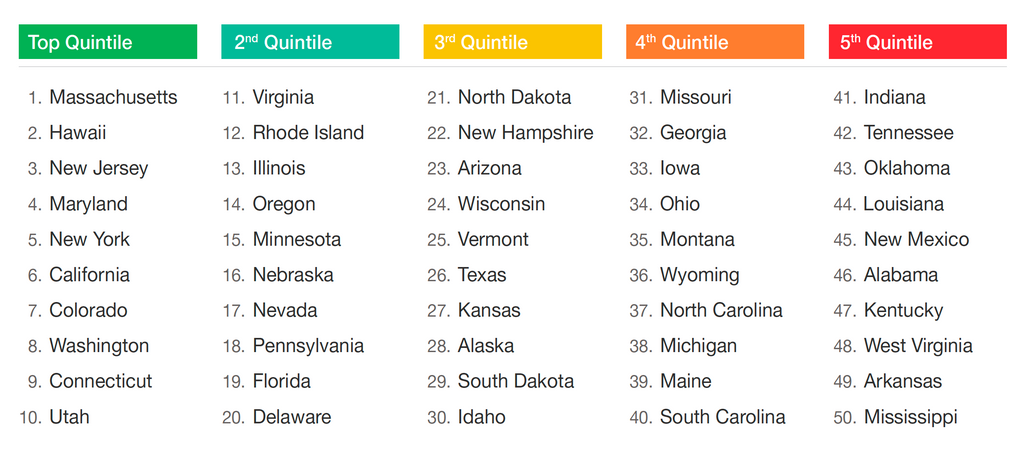Massachusetts Named ‘Healthiest State’ for Third Consecutive Year.

Massachusetts Named ‘Healthiest State’ for Third Consecutive Year
For the third consecutive year, Massachusetts has emerged as the “healthiest state in America” based on rankings of multiple health measures in the Sharecare Community Well-Being Index, the nation’s most comprehensive assessment of community health.
The proprietary research and analysis assessed the well-being of nearly 500,000 Americans spanning all 50 states across individual well-being domains, including physical, social, community, purpose, and financial. A team of faculty supported by BUSPH’s Biostatistics & Epidemiology Data Analytics Center (BEDAC) conducted the extensive data review and also analyzed more than 600 elements of social determinants of health (SDOH) to identify data most associated with community health outcomes: healthcare access, food access, resource access, housing and transportation, and economic security.
Overall, well-being throughout the nation scored 60.7 out of 100, mirroring pre-pandemic levels, despite a slight decrease from last year’s average of 60.9. Nationally, physical health, social and community bonds, and sense of purpose in daily life all saw statistically significant increases. Financial well-being experienced the most substantial decrease and the only negative shift.
“In our review of 2022 data, we found that well-being scores largely remained stable or exhibited positive trends compared to 2021; however, financial well-being emerged as a persisting issue, revealing an undercurrent of economic insecurity possibly linked to inflation and ongoing economic uncertainty, reminiscent of pre-pandemic times,” said Michael Winter, associate director of statistical programming at BEDAC. “This year’s report highlights the importance of addressing all aspects of well-being, which extends beyond physical health to include financial stability and socioeconomic factors as we work together to enhance the well-being of our communities.”
The following 10 states achieved the highest overall well-being scores in the nation:
1. Massachusetts
2. Hawaii
3. New Jersey
4. Maryland
5. New York
6. California
7. Colorado
8. Washington
9. Connecticut
10. Utah
These 10 states had the lowest overall scores:
41. Indiana
42. Tennessee
43. Oklahoma
44. Louisiana
45. New Mexico
46. Alabama
47. Kentucky
48. West Virginia
49. Arkansas
50. Mississippi
Despite minor shifts, the states in the top 10 and bottom 10 have maintained their respective ranks over the past three years. This year’s healthiest states—Massachusetts, Hawaii, and New Jersey—each earned a place among the top three in the nation across several individual well-being domains, earning high scores in financial wellbeing, defined as managing your economic life to increase financial security and reduce stress. These states also demonstrated best-in-nation scores in key SDOH domains, with Massachusetts leading the nation in healthcare access and Hawaii standing out in housing and transportation.
The Bay State achieved top-ten scores in eight of the 10 measured domains: healthcare access (No. 1), housing & transportation (No. 2), purpose well-being (No. 7), financial (No. 3), physical (No. 7), social (No. 9), community (No. 7), and food access (No. 8).
Principal investigator Kimberly Dukes, research associate professor of biostatistics, offered a deeper dive into the Massachusetts rankings and explained that the state Community Well-Being Index score is derived from two equally weighted measures: the Well-Being Index (WBI) and the Social Determinants of Health index (SDOH). The SDOH index measures characteristics such as health access and infrastructure, both of which are difficult to change quickly.
Massachusetts continually ranks first in the SDOH index, which largely drives its ranking, Dukes said. “We also know that there is a strong, positive association between the SDOH index and the WBI, and typically the top performers in WBI are the top performers in SDOH. The converse is true for bottom performers. Although there is some fluctuation year over year in the WBI scores, resulting in shifts in rankings between states, many of the shifts reflect the US overall or particular geographic regions of the US and haven’t had a substantial impact on the top and bottom performers.”
On the other end of the spectrum from the top-tier states, the states with the lowest ranks faced recurring obstacles linked to individual health risks and SDOH, with Mississippi retaining its No. 50 ranking for the fourth consecutive year. Nine of the 10 lowest-ranked states also held a bottom ten ranking for well-being in the community domain, reinforcing the importance of community connection, safety, and pride. Eight of the lowest-ranked states struggled with financial well-being, indicating a heightened sense of financial stress or inadequate resources to thrive among residents.
The 10 lowest ranked states in 2022 are the same states that have been in the bottom of the Index rankings since 2020 – though the rankings have changed within this group, they all remain in the lowest quintile. Similarly, all top 10 states for the 2022 report have maintained “top 10” positions since 2020.
Sharecare Community Well-Being Index, 2022 state rankings

“While we see a general trend towards recovery in well-being levels, the data also reveals persisting disparities between states, with a notable 17.4 point difference when comparing the top and bottom-ranked states,” said Dr. Michael Rickles, vice president of research at Sharecare. “Utilizing these data and insights from the report, we have a unique ability to deepen our customers’ and partners’ understanding of individual health risks, social needs, systemic inequities, and social determinants of health impacting their populations.”
To arrive at these results, Sharecare and BUSPH conducted web surveys among 493,244 U.S. residents aged 18 and older throughout 2022 and analyzed more than 600 elements of SDOH data. To read the full report and to learn about the project’s methodology, visit wellbeingindex.sharecare.com/reports.